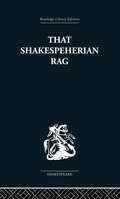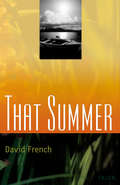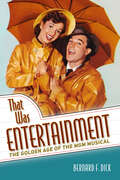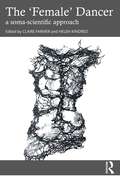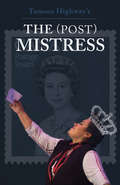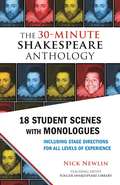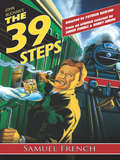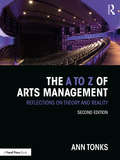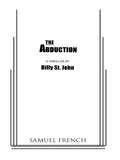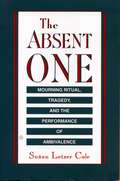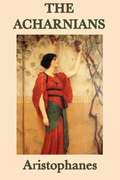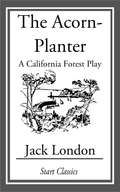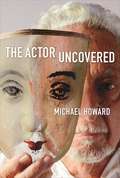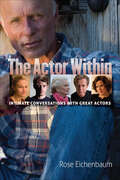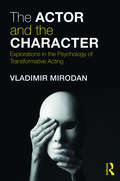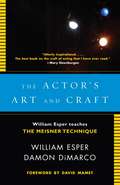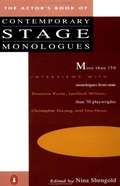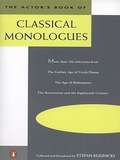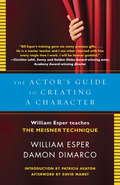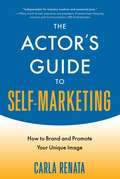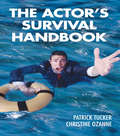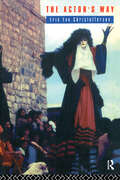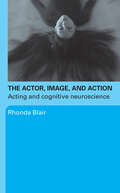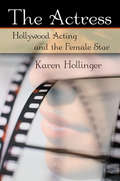- Table View
- List View
That Shakespeherian Rag: Essays on a critical process
by Terence HawkesFirst published in 1986. This collection of essays focuses on the ways in which our society 'processes' Shakespeare and the purposes for which this seems to be done. The case is made by examining the work of four highly influential critics: A C Bradley, Walter Raleigh, T S Eliot and John Dover Wilson. Terence Hawkes asks whether, beyond the readings to which the plays may be subjected, there lies any final, authoritative or essential meaning to which we can ultimately turn, concluding that jazz music offers the most fruitful model for twentieth-century criticism.
That Summer
by David FrenchIt's Memorial Day, 1990, and Margaret Ryan has returned from Vermont to the Ontario cottage country where, thirty-two years before, she had vacationed with her disintegrating family at a lakeside resort. For herself and her sister Daisy, it was a time of awakening, a time of discovery. Both of the girls fall in love with two of the local boys. Daisy, on the lookout for action, cruising the dances at the resort, can't deal with what she initiates, and falls victim to her own confusion and naiveté. Not even the neighbour, the eccentric, bourbon-drinking, cigar-smoking Mrs. Crump, who knows all the fairy-tale spells to capture the heart of a lover, can save Daisy from drowning in her own misadventure. At the same time, Margaret, bookish and withdrawn, inhabiting a universe defined by poets and novelists, is seduced in spite of herself. As Margaret, the narrator, watches Maggie, her younger self, relive the innocence and beauty of that summer, the play moves inexorably back to the heartbreak of a headlong surrender to experience, both won and lost in a single day. Cinematic in its feel and pacing, recalling the 1950s genre of Dirty Dancing and My American Cousin, That Summer is a meditation on what endures of fleeting moments over time. Cast of 5 women and 2 men.
That Was Entertainment: The Golden Age of the MGM Musical
by Bernard F. DickThat Was Entertainment: The Golden Age of the MGM Musical traces the development of the MGM musical from The Broadway Melody (1929) through its heyday in the 1940s and 1950s and its decline in the 1960s, culminating in the notorious 1970 MGM auction when Judy Garland's ruby slippers from The Wizard of Oz, Charlton Heston's chariot from Ben-Hur, and Fred Astaire's trousers and dress shirt from Royal Wedding vanished to the highest bidders.That Was Entertainment uniquely reconstructs the life of Arthur Freed, whose unit at MGM became the gold standard against which the musicals of other studios were measured. Without Freed, Judy Garland, Gene Kelly, Fred Astaire, Ann Miller, Betty Garrett, Cyd Charisse, Arlene Dahl, Vera-Ellen, Lucille Bremer, Gloria DeHaven, Howard Keel, and June Allyson would never have had the signature films that established them as movie legends.MGM's past is its present. No other studio produced such a range of musicals that are still shown today on television and all of which are covered in this volume, from integrated musicals in which song and dance were seamlessly embedded in the plot (Meet Me in St. Louis and Seven Brides for Seven Brothers) to revues (The Hollywood Revue of 1929 and Ziegfeld Follies); original musicals (Singin' in the Rain, Easter Parade, and It's Always Fair Weather); adaptations of Broadway shows (Girl Crazy, On the Town, Show Boat, Kiss Me Kate, Brigadoon, Kismet, and Bells Are Ringing); musical versions of novels and plays (Gigi, The Pirate, and Summer Holiday); operettas (the films of Jeanette MacDonald and Nelson Eddy); mythico-historical biographies of composers (Johann Strauss Jr. in The Great Waltz and Sigmund Romberg in Deep in My Heart); and musicals featuring songwriting teams (Rodgers and Hart in Words and Music and Kalmar and Ruby in Three Little Words), opera stars (Enrico Caruso in The Great Caruso and Marjorie Lawrence in Interrupted Melody), and pop singers (Ruth Etting in Love Me or Leave Me). Also covered is the water ballet musical--in a class by itself--with Esther Williams starring as MGM's resident mermaid. This is a book for longtime lovers of the movie musical and those discovering the genre for the first time.
Thataway Jack
by John RustanFarce / 6m, 2f / 1 Interior, 1 Exterior / The authors of The Tangled Snarl and The Attempted Murder of Peggy Sweetwater turn their manic imaginations loose in the Wild West in this hilarious spoof about a banker who fears losing his mail order bride to a desperado so he impersonates the outlaw. Things really get rolling when the rhyming cowboy and his faithful friend Talking Boar arrive to capture the badman.
The 'Female' Dancer: a soma-scientific approach
by Claire Farmer Helen KindredThe 'Female' Dancer aims to question dancers’ relationships with ‘female’ through the examination and understandings of biological, anatomical, scientific, and self-social identity. The volume gathers voices of dance scientists, dance scholars, somatic practitioners, and dance artist-educators, to discuss some of the complexities of identities, assumptions and perceptions of a female dancing body in an intersectional and practically focused manner.The book weaves a journey between scientific and somatic approaches to dance and to dancing. Part I: 'Bodily Knowledge' explores body image, hormones and puberty, and discussions around somatic responses to the concept of the gaze. Part II: 'Moving through Change', continues to look at strength, musculature, and female fragility, with chapters interrogating practice around strength training, the dancer as an athlete, the role of fascia, the pelvic floor, pregnancy and post-partum experiences and eco-somatic perceptions of feminine. In 'Taking up Space', Part III, chapters focus on social-cultural and political experiences of females dancing, leadership, and longevity in dance. Part IV: 'Embodied Wisdom' looks at reflections of the Self, physiological, social and cultural perspectives of dancing through life, with life’s seasons from an embodied approach.Drawing together lived experiences of dancers in relationship with scientific research, this book is ideal for undergraduate students of dance, dance artists, and researchers, as well as providing dancers, dance teachers, healthcare practitioners, company managers and those in dance leadership roles with valuable information on how to support female identifying dancers through training and beyond.
The (Post) Mistress
by Tomson HighwayMarie-Louise Painchaud has worked for thirty-five years as post mistress at the post office in Lovely, a francophone Canadian village where she has come to know every client whose mail she handles. The (Post) Mistress is a rollicking, emotional rollercoaster-ride in the form of a one-woman musical, with elements of jazz, Berlin cabaret, French café music, and Brazilian samba.
The 30-Minute Shakespeare Anthology: 18 Student Scenes with Monologues
by William Shakespeare Nick NewlinDrawing on his eighteen years of experience as a teaching artist for Folger Shakespeare Library, Nick Newlin offers eighteen scenes to get young actors on their feet performing Shakespeare with confidence, understanding, and fun!Each scene averages five minutes in length, containing two to six characters, and features a monologue that young performers can use in performance, audition, or competition. Every scene has been "road tested" by one of Newlin's student groups at the Folger's annual Secondary School Shakespeare Festival, and includes dynamic stage directions and incisive performance notes to help teachers and students bring Shakespeare's plays to life.The 30-Minute Shakespeare Anthology includes one scene and monologue from eighteen of Shakespeare's greatest plays, including Romeo and Juliet, Macbeth, Hamlet, Othello, A Midsummer Night's Dream, Julius Caesar, Much Ado About Nothing, As You Like It, The Merchant of Venice, and The Taming of the Shrew.Additionally, the anthology contains a scene and monologue from Henry IV Part I, King Lear, As You Like It, The Comedy of Errors, The Tempest, Twelfth Night, The Merry Wives of Windsor, and Love's Labor's Lost.Also featured is an essay by editor Nick Newlin on how to produce a Shakespeare play with novice actors, and notes about the original production of this abridgment at the Folger Shakespeare Library's annual Student Shakespeare Festival. Each scene and monologue has accompanying notes and performance suggestions.
The 39 Steps
by John Buchan Patrick BarlowFrom the Movie by Alfred Hitchcock, Licensed by ITV Global Entertainment Limited and an original concept by Simon Corble and Nobby Dimon Characters: 3m, 1f Comedy WINNER! 2 Tony® and Drama Desk Awards, 2008 WINNER! BEST NEW COMEDY Laurence Olivier Award, 2007 The 39 Steps, is Broadway's longest running comedy, playing its 500th performance on Broadway, May 19th, 2009! Mix a Hitchcock masterpiece with a juicy spy novel, add a dash of Monty Python and you have The 39 Steps, a fast-paced whodunit for anyone who loves the magic of theatre! This 2-time Tony® and Drama Desk Award-winning treat is packed with nonstop laughs, over 150 zany characters (played by a ridiculously talented cast of 4), an on-stage plane crash, handcuffs, missing fingers and some good old-fashioned romance! In The 39 Steps, a man with a boring life meets a woman with a thick accent who says she's a spy. When he takes her home, she is murdered. Soon, a mysterious organization called "The 39 Steps" is hot on the man's trail in a nationwide manhunt that climaxes in a death-defying finale! A riotous blend of virtuoso performances and wildly inventive stagecraft, The 39 Steps amounts to an unforgettable evening of pure pleasure! "A wonderful triumph of theatre!" -BBC Radio 4 "It's really not so much about a spoof of Hitchcock, which it is, of course; it's really an homage to the theater. Not the contemporary theater, where mermaids traverse the stage on wheels and gargantuan mechanical sets get bigger applause than the actors, but the nostalgic version that survives on greasepaint and hammy actors. It's a valentine to that kind of creativity and imagination, of doing so much with so little..." -The New York Times "THEATER AT ITS FINEST... Absurdly enjoyable! This gleefully theatrical riff on Hitchcock's film is fast and frothy, performed by a cast of four that seems like a cast of thousands." -Ben Brantley, The New York Times "The most entertaining show on Broadway!" -Liz Smith, The New York Post "INGENIOUS! A DIZZY DELIGHT!" -Joe Dziemianowicz, Daily News "RIOTOUS & MARVELOUS!" -Clive Barnes, The New York Post "Whirlwind funny business!" -Michael Sommers, The Star-Ledger "a giddy display of theatrical invention!" -David Rooney, Variety "comedy of the highest order!" -Roma Torre, NY1 "About the cleverest show on Broadway in a long time!" -David Richardson, WOR Radio "Rollicking Fun! Hugely Entertaining!" -Sunday Times "Clever, very funny, imaginative and brilliantly acted!" -The Guardian "Dizzyingly entertaining show!" -Daily Telegraph
The A to Z of Arts Management: Reflections on Theory and Reality
by Ann TonksThe A to Z of Arts Management, Second Edition covers 97 topics about the management of arts and cultural organisations. Each section offers a theoretical and conceptual introduction to the topic, as well as storytelling and reflections about the meaning and application of such theories in the real world. Drawing on the author’s past as a manager running media and performing arts companies and her present as a consultant helping Boards and managers, this book covers a wide range of topics, from leadership, motivation and cultural policy to passion, coffee and laughter. This second edition includes even more coverage and stories about the challenges of arts management, and new topics such as harassment, philanthropy and venues. Written for arts managers, students and Board members anywhere in the world, The A to Z of Arts Management provides information about research and academic best practice in arts management alongside stories about the reality of working in the arts and cultural industries.
The Abduction
by Billy St. JohnThriller \ 5m, 2f \ Interior \ What begins as a pleasant anniversary dinner for novelist Allen Grant, his wife Sheila and her daughter Cindy ends in terror when Cindy is forced off the road and abducted while driving back to college during a thunderstorm. Cindy and the icily determined kidnapper both speak with Allen and Sheila during the abduction via cell phones, the horrifying voice of the abductor coming through their speaker phone eerily distorted by a synthesizer. Tension mounts as Allen tries to raise the demanded ransom by the kidnapper's deadline. Cindy's boyfriend searches for clues to her whereabouts and Shelia, who never fully recovered from the tragic accident that killed her first husband, Cindy's father, totters on the brink of a nervous breakdown. Unrelenting phone calls and a horrifying "souvenir" from the abductor push this thriller to a shattering climax.
The Absent One: Mourning Ritual, Tragedy, and the Performance of Ambivalence
by Susan L. ColeHere is presented a new theory of the origins of tragedy, based on its perceived kinship with mourning ritual. Mourners and tragic protagonists alike journey through dangerous transitional states, confront the uncanny, express themselves in antithetical style, and, above all, enact their ambivalence toward their beloved dead. Elements common to both tragedy and mourning ritual are first identified in actual Chinese, African, and Greek funerary rites and then analyzed in tragedies by Aeschylus, Sophocles, Shakespeare, Racine, Ibsen, O'Neill, Miller, Beckett, and Ionesco. Included is a firsthand account of exploration of the tragedy-mourning link in the rehearsal process of the great experimental theater director, Joseph Chaikin. Opening her first chapter, Dr. Cole says, "The grave is the birthplace of tragic drama and ghosts are its procreators. For tragedy is the performance of ambivalence which ghosts emblematize: what we fear in particular--the revenant, the ghost returning to haunt us--is also what we desire--the extending of life beyond the moment of death. "
The Acharnians
by AristophanesWriting at the time of political and social crisis in Athens, Aristophanes was an eloquent yet bawdy challenger to the demagogue and the sophist. The Achanians is a plea for peace set against the background of the long war with Sparta.
The Acorn-Planter: A California Forest Play
by Jack LondonJack London was an American novelist, journalist, social-activist and short-story writer whose works deal romantically with elemental struggles for survival. At his peak, he was the highest paid and the most popular of all living writers. Because of early financial difficulties, he was largely self educated past grammar school. London drew heavily on his life experiences in his writing. He spent time in the Klondike during the Gold Rush and at various times was an oyster pirate, a seaman, a sealer, and a hobo. His first work was published in 1898. From there he went on to write such American classics as Call of the Wild, Sea Wolf, and White Fang.
The Actor Uncovered
by Michael HowardA Far-Reaching and Truthful Exploration of Acting in All Its FormsThe Actor Uncovered is certainly not a set of rigid rules advocating one "method" or one singular "truth." Departing from the common guidebook format, Michael Howard uses a unique approach to teaching acting, reflecting on his own history and sharing his own experiences as an actor, director, and teacher. How he writes about the process and craft of acting is at once intensely personal and relatable by others.Readers are invited to participate as though present in this master teacher's classes. Each human being, and thus each actor, is unique. Howard encourages actors to uncover their own ways of working, using their particular abilities and personality traits. Going beyond the craft and into human psychology and the importance of acting as a life force, readers will see new and deeper ways to study and practice, to be introspective, and to arrive at places of revelation about their craft.The Actor Uncovered will have much to say to beginners, to those who are advanced, and to professional and working actors. Howard discusses such topics as:Techniques, styles, and methods in a changing societyRelaxation, concentration, and the breathThe relationships among actor, director, and writerMemoryOn camera versus on stageObstaclesAfter more than seventy years as a professional actor, director, and teacher, Howard shows how living creatively and invoking one's own personality can lead to a successful career as an actor.
The Actor Within: Intimate Conversations with Great Actors
by Rose EichenbaumIn Rose Eichenbaum's third work on the confluence of art making and human expression, she delves into the lives of thirty-five celebrated actors through intimate conversations and photographic portraits. With her probing questions and disarming manner, she captures the essential character of her subjects while shining a light on the art that defines them. The work provides extraordinary insights on the craft of acting with discussions of process, techniques, tools of the trade, and how to advice for aspiring actors from seasoned veterans. These stars of stage and screen, known for signature roles and critically acclaimed performances, emerge in The Actor Within with masks and wardrobe removed. Here, they speak their own lines, tell their own stories, and raise the curtain on what it means to live the actor's life—the challenge of mastering their craft, the drama of big breaks and career woes, the search for meaningful roles, and above all, having the courage to bare their souls before theater audiences or the camera. For the artists featured in this work, acting is more than a profession; it is how they make their way in the world and artfully merge their inner sense of humanness with universal truths. This collection serves as an important inspirational resource for anyone interested in making art, regardless of medium.The Actor Within includes interviews with Karl Malden, Ruby Dee, Ed Harris, Piper Laurie, Marcia Gay Harden, William H. Macy, Ellen Burstyn, Joe Mantegna, Debra Winger, Julia Stiles, Elliott Gould, Elijah Wood, Stockard Channing, Bill Pullman, Amanda Plummer, Marlee Matlin, Charles Durning, Marsha Mason, and many others.
The Actor and the Character: Explorations in the Psychology of Transformative Acting
by Vladimir MirodanTransformative acting remains the aspiration of many an emerging actor, and constitutes the achievement of some of the most acclaimed performances of our age: Daniel Day-Lewis as Lincoln, Meryl Streep as Mrs Thatcher, Anthony Hopkins as Hannibal Lecter – the list is extensive, and we all have our favourites. But what are the physical and psychological processes which enable actors to create characters so different from themselves? To understand this unique phenomenon, Vladimir Mirodan provides both a historical overview of the evolution of notions of 'character' in Western theatre and a stunning contemporary analysis of the theoretical implications of transformative acting. The Actor and the Character: Surveys the main debates surrounding the concept of dramatic character and – contrary to recent trends – explains why transformative actors conceive their characters as ‘independent’ of their own personalities. Describes some important techniques used by actors to construct their characters by physical means: work on objects, neutral and character masks, Laban movement analysis, Viewpoints, etc. Examines the psychology behind transformative acting from the perspectives of both psychoanalysis and scientific psychology and, based on recent developments in psychology, asks whether transformation is not just acting folklore but may actually entail temporary changes to the brain structures of the actors. The Actor and the Character speaks not only to academics and students studying actor training and acting theory, but contributes to current lively academic debates around character. This is a compelling and original exploration of the limits of acting theory and practice, psychology, and creative work, in which Mirodan boldly re-examines some of the fundamental assumptions of actor training and some basic tenets of theatre practice to ask: What happens when one of us ‘becomes somebody else’?
The Actor's Art and Craft: William Esper Teaches the Meisner Technique
by William Esper Damon DimarcoWilliam Esper, one of the leading acting teachers of our time, explains and extends Sanford Meisner's legendary technique, offering a clear, concrete, step-by-step approach to becoming a truly creative actor.Esper worked closely with Meisner for seventeen years and has spent decades developing his famous program for actor's training. The result is a rigorous system of exercises that builds a solid foundation of acting skills from the ground up, and that is flexible enough to be applied to any challenge an actor faces, from soap operas to Shakespeare. Co-writer Damon DiMarco, a former student of Esper's, spent over a year observing his mentor teaching first-year acting students. In this book he recreates that experience for us, allowing us to see how the progression of exercises works in practice. The Actor's Art and Craft vividly demonstrates that good training does not constrain actors' instincts—it frees them to create characters with truthful and compelling inner lives.
The Actor's Book Of Contemporary Stage Monologues: More Than 150 Monologues From More Than 70 Playwrights
by Nina Shengold Smith Kraus Inc. StaffThis is the only book that offers a comprehensive collection of contemporary stage monologues for a complete range of roles. An invaluable tool for actors looking for new audition material or for anyone interested in theater.
The Actor's Book of Classical Monologues
by VariousA challenging, wide-ranging collection of monologues from history’s greatest dramatic works. From the stately and poetic Greek tragedies to the lively, bawdy Restoration comedies, the classical repertoire is a treasure trove of often-overlooked materials for male and female, young and old. The solo pieces collected here vary widely in mood, style, and level of challenge; they include a generous supply of Shakespeare and his contemporaries; and they’re fleshed out with brief plot synopses and valuable historical material. Stefan Rudnicki, an accomplished actor, director, and teacher, also provides practical tips on preparing each scene for audition or performance. Among the playwrights whose works are included are: Aeschylus Sophocles Euridipes Aristophanes Shakespeare Tourneur Kyd Middleton Jonson Sheridan Dryden Congreve …and many others.
The Actor's Guide to Creating a Character: William Esper Teaches the Meisner Technique
by David Mamet Patricia Heaton William Esper Damon DimarcoWilliam Esper, one of the most celebrated acting teachers of our time, takes us through his step-by-step approach to the central challenge of advanced acting work: creating and playing a character. Esper's first book, The Actor's Art and Craft, earned praise for describing the basics taught in his famous first-year acting class. The Actor's Guide to Creating a Character continues the journey. In these pages, co-author Damon DiMarco vividly re-creates Esper's second-year course, again through the experiences of a fictional class. Esper's training builds on Sanford Meisner's legendary exercises, a world-renowned technique that Esper further developed through his long association with Meisner and the decades he has spent training a host of distinguished actors. His approach is flexible enough to apply to any role, helping actors to create characters with truthful and compelling inner lives.
The Actor's Guide to Self-Marketing: How to Brand and Promote Your Unique Image
by Carla RenataStand Out from the Competition! How do actors sell their personality? What does it take to make a lasting impression? How can actors use their image to achieve their dreams? The Actor's Guide to Self-Marketing answers all these questions and more. With a background in acting and publicity, author Carla Renata has gathered insider info and proven tips to help actors create their own brand and utilize it for success. With The Actor's Guide to Self-Marketing, you will learn how to: Highlight unique traits and skills Distinguish yourself from the crowd Market yourself through social media Angle for your dream role And so much more! Renata's methods have been tested and developed through her branding and social media program, The Branding Buddha, which has been taught online and privately, as well as in group classes at top universities in the United States. Along with tips from her program and extensive background in the field, Renata uses meditative practices and self-actualization to help actors develop their public image and reach their goals with clarity and intention. As she writes, "The mind is everything. What you think, you will become." With The Actor's Guide to Self-Marketing, you'll be well on your way to becoming the actor you really want to be and landing your dream roles.
The Actor's Survival Handbook
by Patrick Tucker Christine OzanneWorried about short rehearsal time? Think that fluffing your lines will be the end of your career? Are you afraid you'll be typecast? Is there such a thing as acting too much? How should a stage actor adjust performance for a camera? And how should an actor behave backstage?The Actor's Survival Handbook gives you answers to all these questions and many more. Written with verve and humor, this utterly essential tool speaks to every actor's deepest concerns. Drawing upon their years of experience on stage, backstage, and with the camera, Patrick Tucker and Christine Ozanne offer forthright advice on topics from breathing to props, commitment to learning lines, audience response to simply landing the job in the first place. The book is rich with examples - both technical and inspirational. And because a director and an actor won't always agree, the two writers sometimes even offer alternative responses to a dilemma, giving the reader both an actor's take and a director's take on a particular point.Like Patrick Tucker's Secrets of Screen Acting, this new book is written with wit and passion, conveying the authors' powerful conviction that success is within every actor's grasp.
The Actor's Way
by Erik Exe ChristoffersenCan 'stage presence' be acquired? Why do some actors appear more dynamic in performance than others? In The Actors Way four experienced actors talk about the secrets and the practical realities of over twenty-five years of theatre training with Odin Teatret. Under the unique direction of Eugenio Barba, director of Odin Teatret, they have explored issues such as the connections between physical and mental work on stage, how to gain and control the spectator's attention, and intercultural performance techniques. The Actor's Way is a fascinating account of personal and professional development in the theatre. It will be vital reading for drama students and actors, but enjoyable and illuminating for anyone interested in the craft of acting.
The Actor, Image, and Action: Acting and Cognitive Neuroscience
by Rhonda BlairThe Actor, Image and Action is a 'new generation' approach to the craft of acting; the first full-length study of actor training using the insights of cognitive neuroscience. In a brilliant reassessment of both the practice and theory of acting, Rhonda Blair examines the physiological relationship between bodily action and emotional experience. In doing so she provides the latest step in Stanislavsky's attempts to help the actor 'reach the unconscious by conscious means'. Recent developments in scientific thinking about the connections between biology and cognition require new ways of understanding many elements of human activity, including: imagination emotion memory physicality reason. The Actor, Image and Action looks at how these are in fact inseparable in the brain's structure and function, and their crucial importance to an actor’s engagement with a role. The book vastly improves our understanding of the actor's process and is a must for any actor or student of acting.
The Actress: Hollywood Acting and the Female Star
by Karen HollingerThe Actress: Hollywood Acting and the Female Star investigates the contemporary film actress both as an artist and as an ideological construct. Divided into two sections, The Actress first examines the major issues in studying film acting, stardom, and the Hollywood actress. Combining theories of screen acting and of film stardom, The Actress presents a synthesis of methodologies and offers the student and scholar a new approach to these two subjects of study.
